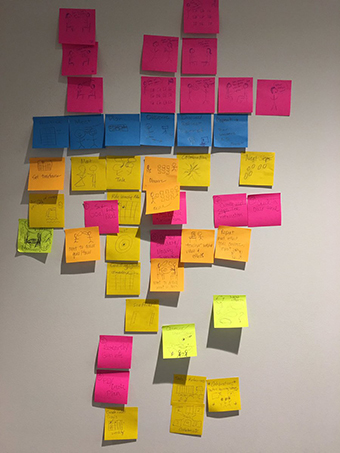 Where do research topics come from?
Where do research topics come from?
The research topic you have at the start of your PhD may come from work you did in your Masters. It may come from a professional or policy context, perhaps your own professional work situation, or something you’ve read about in the media. Or it might come from the scholarly reading that you’ve done.
People generally start their PhD with an idea of what they want to research. They’ve had to put in a proposal as part of the entry process.
But this initial idea is not fixed. It might change. Yes really. Your first idea may not be what you end up researching. Your primary task in the first few months of PhD candidacy is to revisit and refine your initial topic so that it becomes a research-able project. A researchable project that is focused on the potential contribution you will make by doing it.
Your task, in the first few months of the PhD, is to refine your topic – through reading. You read to find:
(1) what other people already have said about your topic
Many PhDs, not all, but most, find themselves researching a topic where a corpus of research and literature already exists. This research might be exactly on the topic that you are interested in, or it might be in a related, overlapping area. As you read, you can begin to see how your proposed topic sits in relation to what already exists
(2) what material you need in order to make sense of your topic
You’ll usually find and read bodies of literature that establish the wider context within which your research sits. These literatures provide you with important contextual information. They offer you examples of the differing research traditions that you might work within. They show different conceptual and theoretical possibilities that you might take up in your study.
(3) ‘less likely’ material that also might have something interesting to offer to your topic
Sometimes, reading outside of your discipline, reading something tangential, provides you with an angle on your topic that is new and interesting. Many PhDs neglect this wider reading in favour of the first two, more focused, literatures work. This is not a mistake, but an omission that might mean your work is not as “original” as it could perhaps be.
At the end of this beginning reading, you should be much clearer about what research is and isn’t done about your topic. You can therefore think about what possibilities there are for you – what you might do and accomplish in your PhD. Perhaps you will look at a different group of people, or work in a different place, or work in a different tradition. Perhaps you’ll bring a different theoretical tradition to bear on the topic or combine perspectives across disciplines – maybe one/some that are not usually brought to the topic. The process of bringing your topic into conversation with the literatures is often called finding the gap – although most often we are not talking about a gap, but rather a niche. A niche that you can occupy.
Once you’ve completed this early reading, you can then reconsider your initial topic – and modify it if you need/want to.
In addition, you will also need to read at the start:
(4) how your topic can be researched.
This methodological reading is often the crunch point. This reading helps you to decide whether there is a defensible way to find an answer to the question or problem you have tentatively formulated. You look at various methodological and methods possibilities to see which of them are most likely to yield interesting data. You think about how these might be analysed.
You can also check how much time different approaches will take, and -scarily- whether it is even possible to do what you want, given questions of access, distance, cost and so on. You can see whether yours is a topic for one person for a year or so full time equivalent field work or whether it needs a team of people for several years! These practical issues are vital for you to consider… many a PhD topic has to be modified simply because the research isn’t actually do-able.
At the end of this early period of reading you will be in a position to come back to your initial research idea.
Read your proposal again. Is it still OK? Then consider:
- How might you express your proposed project – In a question? Aims and Objectives? As an hypothesis to be tested?
- What is the contribution it will make?
- What is the research design?
If you have read thoroughly enough, then you will be able to answer all of these questions –convincingly and concisely – after just a few months.
